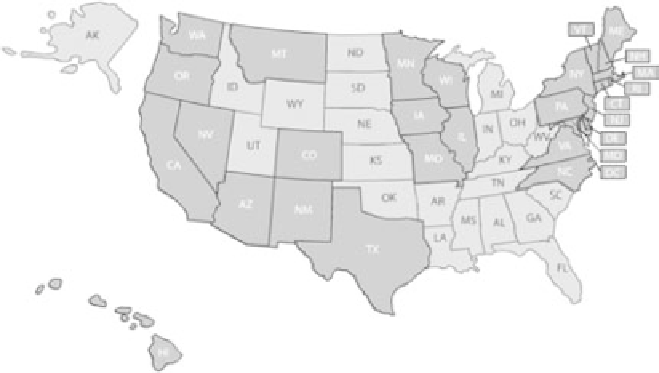Environmental Engineering Reference
In-Depth Information
Source:
DOE/EERE.
Figure 20.2
States with RPS (in dark grey), June 2007
'Renewable energy' is not a GATS sector,
per se
, and generation of electricity is not
likely covered by GATS because it is seen as production of a good. However, the USA is
fully committed under 'Services incidental to energy distribution' (USA, 2005, modes 1,
2, 3). In addition to local distribution of electricity, this commitment covers transmission
in commercial markets (WTO, 2007a; USA, 2000).
Twenty-eight states (see Figure 20.2) have developed Renewable Portfolio Standards
(RPS) as a way to stimulate development of renewable sources. RPS obligates distribu-
tors to purchase a minimum and growing percentage of their electricity from renewable
sources, including wind, solar, geothermal, biomass and small-scale hydro (less than 30
MW) (DOE/EERE, 2007). RPS governs purchases by retail distributors (among others),
so it is likely covered by the US commitment.
The US International Trade Commission reports few barriers to trade in renewable
energy services, but the ITC did not study hydroelectric generation or transmission.
Canada is eager to o
er both: vast hydro capacity and a transmission grid that reaches
the northern tier of US cities.
Ninety-six percent of Canada's electricity comes from large dams (greater than 30
MW), which RPS rejects as non-renewable. Large dams block salmon migration, cause
sedimentation and concentrate toxins. However, Canadians think that the impact on
Canadian rivers is their issue to manage. Canada's trade ministry argues that state RPS
laws discriminate: they deny national treatment under NAFTA and GATT, which cover
electricity as a good (DFAIT, 2007).
Several analysts reason that RPS does not
ff
unk the national treatment test for two
reasons. First, they argue that renewable electricity is not a 'like product' that can be
compared to non-renewable electricity, but this interpretation has yet to be tested before
the WTO. Second, under GATT, a violation of national treatment could be excused
by GATT's general exception for resource conservation. The WTO's Appellate Body
fl



